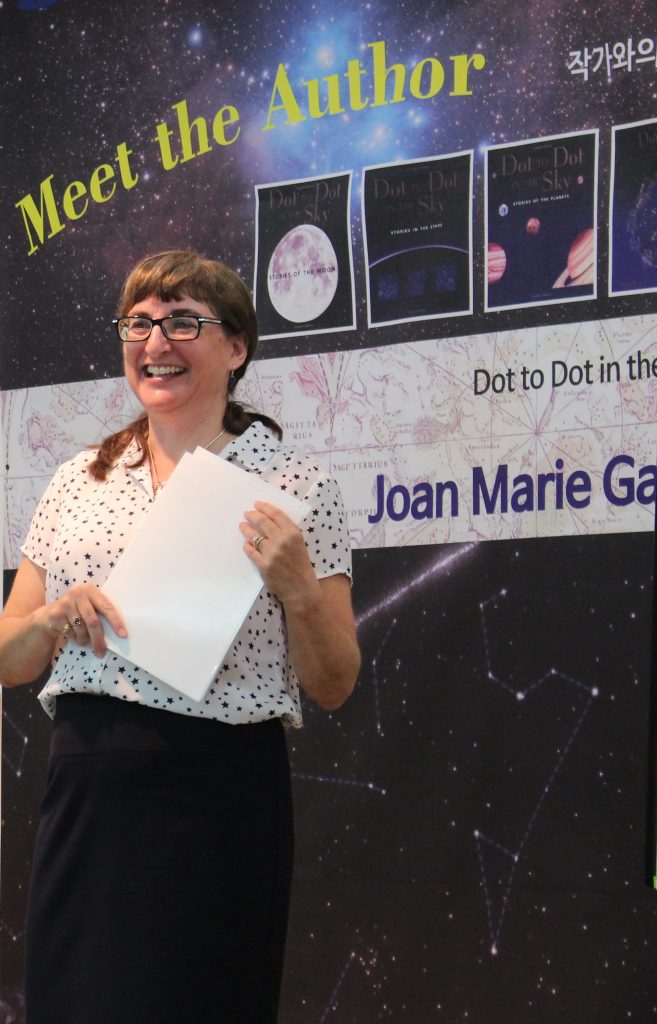The following is a blog from Capital City Press featured writer Joan Marie Galat. You can read her three part blog series on writing science for kids with part one called Satisfy Your Curiosity with Children's Non-Fiction, part two Pathways to Science Writing for Kids and the third part Sharing Science Books in Schools.
Author visits at schools and libraries are special occasions that benefit both students and educators. Students grow more interested in reading books when they get to “meet” an author. Teachers, as well as parents who attend literacy events, gain more tools for promoting literacy. They will find many opportunities to build on the momentum a presentation generates.
A lively author talk will trigger interest in new topics, motivate students to read for pleasure, and provide literacy-boosting insights into the writing life. Most students are surprised to discover it is normal for authors to generate a great many rough copies. I love to let students know a good writer isn’t a person who writes a perfect sentence on the first try. They’re so relieved!
Author talks allow me to show students that practice is a normal and necessary part of writing. I also want children to discover that reading leads to new adventures. I demonstrate this by showing my stiltwalking video, opens a new window. The connection? I would never have learned to walk on stilts if I hadn’t read about the opportunity.
Visiting authors provide unique tips that can help educators teach writing, as well as help parents support learning. Hosting a local author allows librarians and teachers to make the point that “authors live in our community” and “you can write too.” As well as promoting literacy, authors may have titles or presentations that specifically make curriculum connections to science, social studies, math, and other subjects. Schools benefit by offering enrichment that both educates and entertains.
The most successful author presentations occur when students are prepared in advance. If you decide to host an author, make your event meaningful by following these tips.
BEFORE THE AUTHOR VISIT
- Build excitement with a countdown to “author day” over your PA system.
- Familiarize yourself, and your students, with the author’s work in advance. Visit websites, read reviews, and watch book trailers. (As an example, you can see my book trailers)
- Talk about the section of the library where the author’s books can be found.
- Involve students in preparations. You might select students to prepare and deliver an introduction or assign two students to escort the author to the presentation location.
- Encourage students to use their writing skills. Ask them to create welcome posters or prepare closing comments to read at the end of the talk.
- Suggest students write three questions they would like to ask the author. If they discover the answers during the presentation, they can record the answers and share them during your classroom follow-up discussion.
- Make sure several copies of the titles, appropriate for your grades, are in your school library. Ask the librarian/teacher/volunteer to show the books to the students. Encourage borrowing.
- Make sure you understand the fee schedule associated with your visit. Authors are professionals who charge for public speaking. It is standard for hosts to also cover travel expenses.
ON EVENT DAY
- Set up your presentations space before the author arrives.
- If technology is required, make sure you have fresh batteries in your remote control and someone available to help with troubleshooting.
- Ensure teachers are active participants during the event. It’s important for adults to model active listening, maintain class discipline, and focus/stimulate students’ questions.
- Mute and put away mobile devices and other electronics, except to take photos.
- Refrain from taking video of the author unless you have obtained prior permission.
- Welcome the author and have fun!
FOLLOW UP
- Ask students to write about what they were surprised to learn about writing books, the author, or subjects discussed.
- Look for the author on social media and post a thoughtful follow-up question.
- Remind students to visit the library and explore the topics presented by the author.
- Build ongoing literacy by providing students with the opportunity to purchase autographed books. Book ownership allows young readers to revisit content, grow reading skills, and increase their likelihood of pursuing higher education.
- Let parents know about the author visit. Ask them to discuss it with their children.
EPL Featured Writer, Joan Marie Galat is the author of more than 20 books. Her titles include Solve This! Wild and Wacky Challenges for the Genius Engineer in You (National Geographic Kids), the Dot to Dot in the Sky series (Whitecap Books), and Dark Matters—Nature’s Reaction to Light Pollution (Red Deer Press). She writes from Parkland County, near Edmonton.




Add a comment to: How to Host a Successful Author Visit